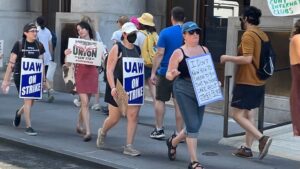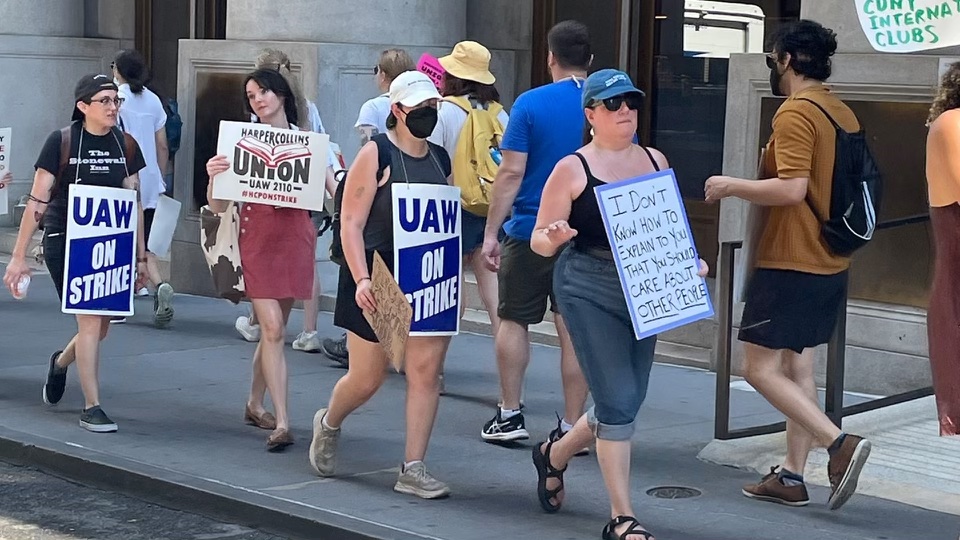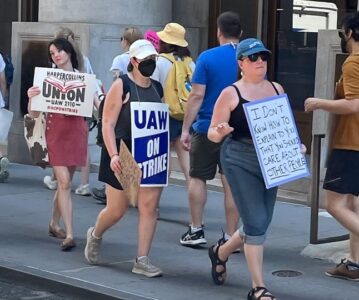Jennifer Albert Mann reports on the recent UAW Local 2110 strike at HarperCollins Publishers and argues that, considering the union’s past militancy, HarperCollins workers should begin to take a more active political stance against the company’s reactionary ownership.

HarperCollins is on strike. Editorial, publicity, sales, marketing, legal, and design workers walked off the job on November 10th. The contract between HarperCollins and HarperCollins UAW Local 2110 expired in April of 2022. Negotiations, which began in December of 2021, have since stopped.
HarperCollins UAW Local 2110 is striking for (1) an increase in minimum salaries from $45,000 to $50,000, (2) a commitment to diversity, and (3) the requirement that all eligible workers join the union.
HarperCollins is the only unionized Big Five publisher in the industry. The other four of the Big Five are Penguin Random House, Simon & Schuster, Hachette Book Group, and Macmillan. It was 1974 the first time a mostly white female staff walked off on strike.1 Today, it sadly continues to be a mostly white female staff walking the picket line.
White women have historically been asked to work for “passion” instead of salary. Female-oriented professions are ripe with working for someone or for something (ie. students, sick people, children, or books) instead of for money. In publishing, a second sexist non-monetary compensation is given… social power. Especially prevalent in the editorial department, women are “paid” the prestige of working in publishing instead of being paid on a monetary level, as is witnessed by the difference in wages of the predominantly junior young white women in editorial departments compared to the senior white male staff.
Not only does passion not pay the bills, working for passion assumes privilege—the reason for the overall whiteness found in the publishing industry. Low salaries often help to exclude workers of color who frequently lack the financial advantages of their white peers, and is the reason Local 2110 has included a commitment to diversity as the second of their three top demands. The relationship between a living wage in one of the most expensive cities in the United States and a more diverse industry cannot be denied—the second becomes less likely without the first. It is not, however, only an issue of race, but one of class. The majority of those who stay in publishing often can only do so as a result of independent wealth, which can make up for the lack of a decent salary. HarperCollins workers recognize that the only way to diversify their ranks is to end a status quo which assumes that those working in the industry have a means of financial support outside their work.
The third demand is a commitment to the union. With only 6% of HarperCollins unionized, Local 2110 is seeking union security in the form of an agreement which would require all eligible workers to join the union. Back in 1974, the workers who walked out represented approximately half of the New York‐based employees. Today, the union represents approximately this same amount. A strong bargaining power for a living wage and a diverse workplace, as well as strong supporters of the power of stories—including marginalized voices—requires a strong union.
When Harper & Row employees walked off the job in 1974, they were unrepresented by a union. Following the strike, they joined District 65 of the Distributive Workers of America (DWA)— an independent union, yet one with an interesting history.2
District 65 burst onto the scene in 1933 in response to the passage of Section 7(a) of NIRA when a group of wholesale dry goods workers on New York’s Lower East Side organized themselves into a union. In 1935 District 65 joined the AFL as Local 19932 Wholesale Dry Goods Employees Union (WDGEU-AFL). But when 65 continued to operate on an industrial basis (across an industry vs. based on craft) the AFL wasn’t happy as the federation championed conservative craft-based unions. By 1937, the pressure of the AFL became too much, and the WDGEU-AFL merged with the THWU-CIO (Textile House Workers Union) and formed the first Local 65 under Textile Workers Organizing Committee (TWOC), breaking from the AFL to join the more left-leaning CIO. That same year, Local 65 merged again, joining with the URWEA-CIO (United Retail and Wholesale Employees of America).
During WWII women entered Local 65 in great numbers quickly becoming the majority of the membership. But following the war, the URWEA-CIO signed the Taft-Hartley Act’s non-communist affidavits, and Local 65 seceded in protest. Sadly, after further pressure, 65 ended up signing the anti-communist affidavits.
The 1950s saw more mergers and growth, and Local 65 became District 65 of the URWDSU under the now merged AFL-CIO (Retail, Wholesale and Department Store Union). This growth in retail workers brought diversity to the union with the inclusion of Black, Puerto Rican, Italian, and Irish workers where it had previously been primarily white Jewish workers in the wholesale dry goods and textile shops. At this time, District 65 began its first organizing forays into white collar workers: clerks, writers, editors, technicians, and lawyers.
In the 1960s and 70s District 65 would reconnect with its leftist roots by opposing the Vietnam War and helping to found the Labor for Peace Coalition. Due to these member views on foreign policy and civil rights, the local would be ousted from the RWDSU. District 65 would go on to organize itself independently as the National Council of the Distributive Workers of America—the union workers at Harper & Row joined in November of 1974.
Following in the footsteps of its organizing efforts in the 1950s, this independent union would go on to organize clerical workers at Barnard and Columbia universities, editors at Simon & Schuster, Random House, and Prentice-Hall, employees of the Museum of Modern Art; writers at the Village Voice; and more before joining first the American Labor Alliance, and then in 1987, merging with UAW.3 In a final move, HarperCollins UAW Local 2110 would emerge from District 65’s Technical, Office and Professional Division, representing the HarperCollins workers walking the picket line today.4
Although there are many similarities between the strike of 1974 and today’s strike, there is one stark difference—the reaction from the top of the company.
Fifty years ago, CEO Winthrop Knowlton wrote in distress to his supervisory staff, “my colleagues share my dismay” that “the house is now faced with the first strike in the memory of most of us.”5 However, today’s CEO, Brian Murray’s response, found in a now-deleted report on the company’s profits, was something less than concern—some people will always want more.6 In a press release written by Murray on December 6th, he emphasized the complexity of the industry in lieu of detailed answers to the demands of the union, filling the letter with phrases anyone who has spent a minute in labor will recognize:
HC has been “negotiating in good faith for more than a year.”
“We strongly believe that each HarperCollins employee should have the right to make their own choice whether or not to pay dues to the United Auto Workers,” since it “typically require substantial union dues.”
HC has “proposed a fair and reasonable pay structure,” to “contend with ongoing challenges to publishing and its underlying economics.”7
How “challenged” is HarperCollins in their “underlying economics?” HarperCollins is owned by Rupert Murdoch’s NewsCorp, which in 2021, witnessed an increase of approximately $1 billion in revenue.8 In this same year, it compensated its CEO $23 million and repurchased $1 billion of its own stock.9 For 2022, the company is reporting a 10 percent increase in revenue over last year. NewsCorp bought Harper & Row, along with Scottish publisher William Collins and Sons, in 1989, and immediately merged them.10
Murdoch and his family own NewsCorp, which in turn owns Fox News, Dow Jones & Company, the Wall Street Journal, and the New York Post, and hundreds of other local, national, and international publishing businesses around the globe. He has a history of staffing cuts, wage freezes, recruiting scab labor, and breaking unions.11 During his most famous conflict against unions, in the UK in the 1980s, he invented a fictitious company and began employing it with workers under the conditions of no union recognition, no closed shop, new technology to be introduced at any time followed by job cuts, and the company’s sole right to manage.12 In reality, it was all a ploy to move his existing UK newspapers to the plant he built for the fake company and thereby smash the printing unions, which he did.
Brian Murray has been President and Chief Executive Officer of HarperCollins Publishers since 2008. The first thing his official HC bio dictates is that under his direction, “HarperCollins has grown its revenues 50%.” He also served on the Executive Committee of the International Publishers Association. Business associations are formed solely to have the backs of business owners, and have historically been used to crush unions for, at this point, centuries. Finally, before joining HarperCollins, Murray worked for the Pentagon contractor Booz Allen Hamilton.13 This private military contractor garners a good portion of the $80 billion spent annually on U.S. intelligence agencies, along with profiting from mass incarceration via prison labor manufacturing weapons.14
Despite book sales rising during the pandemic and Forbes magazine declaring publishing a highly profitable business—HarperCollins cut jobs in October. Murray stated, “We will be pausing a majority of hiring,” and “we need to control costs and operate as efficiently as possible.”15 Meanwhile, a class action lawsuit has been filed against the Big Five publishers (including HarperCollins) for having engaged in price-fixing with Amazon to prevent competition and artificially inflate the price of e-books.16
Together, NewsCorp and HarperCollins, (Rupert Murdoch and Brian Murray) turn out to be formidable opposition for the striking workers.
Back in 1974, the Harper & Row strikers were supported on the picket line by the employees of six other publishing houses, as well as a solid war chest contributed by the same.17 Today, many in the industry stand in the corner of Local 2110. 150 top literary agents showed their support of striking workers via an open-letter, pledging to, “stand with them in their demands for a living wage, a more equitable and diverse workplace, and stronger union protections. Until an agreement is reached and the strike ends, we will not be submitting new projects to HarperCollins beyond those already under contract.”18 500 authors also supported the strikers (including myself) in yet another open-letter, “We stand with the people who mold and champion our work and ask that they be compensated justly and fairly for their labor. Our hope is that HarperCollins will not be satisfied with meeting an industry standard that is far too low to retain top talent.”19 Outside of the industry, Local 2110 has plenty of company on the picket line and plenty of potential allies: railroad workers, academics, newsroom workers, journalists, airport workers, baristas, IT workers, etc.
The 1974 strike ended in 17 days.20 As of this writing, workers have been out for over 33 days. One of the signs spotted at the front of the picket line this week read, “I don’t know how to explain to you that you should care about other people.”21
Perhaps HarperCollins can learn by opening up a book.
Perhaps even one of its very own bestsellers: The Giving Tree by Shel Silverstein, Charlotte’s Web by E.B. White, or Frog and Toad Together by Arnold Lobel.22
Perhaps the call to care about people is not only a way forward for Local 2110, but also a reaching back to embrace its own storied past. In owning its militant history, perhaps Local 2110 should take a more openly political stance against their owner—one of the most reactionary capitalists on the planet; a right-wing media baron who created Fox News, Rupert Murdoch has been a key figure in shaping the reactionary capitalist present. With the politics of their company’s ownership in mind, perhaps the path forward for HarperCollins Local 2110 might be to see itself as not only a union of publishing professionals, but as an organization of caring people leading the fight against capital for a more equitable world.
Join the picket line in solidarity with HarperCollins UAW Local 2110 on December 16th at 12:30pm for a Defiance Rally, along with other authors, booksellers, agents, and publishing workers. Support the strike fund here.

- https://www.nytimes.com/1974/06/16/archives/harper-row-employes-set-to-strike-boisterous-voice-vote.html.
- https://www.nytimes.com/1974/06/18/archives/200-at-harper-man-the-picket-lines-dissent-by-knowlton-calls-from.html; http://dlib.nyu.edu/findingaids/html/tamwag/wag_006/bioghist.html.
- https://www.nytimes.com/1987/02/26/nyregion/district-65-becomes-unit-of-the-uaw.html.
- https://uaw.org/maida-rosenstein-president-united-auto-workers-local-2110-technical-office-professional-workers-honored/amp/.
- https://www.nytimes.com/1981/01/20/arts/knowlton-to-give-up-2-posts-at-harper-row.html; https://www.nytimes.com/1974/06/16/archives/harper-row-employes-set-to-strike-boisterous-voice-vote.html.
- https://www.nplusonemag.com/online-only/online-only/harpercollins-strike-dispatch/.
- https://www.harpercollins.com/blogs/press-releases/an-open-letter-to-authors-and-agents.
- https://companiesmarketcap.com/news-corp/revenue/#:~:text=In%202021%20the%20company%20made,sale%20of%20goods%20or%20services.
- https://www.leftvoice.org/hapercollins-workers-go-on-strike-because-passion-doesnt-pay-the-rent/; https://newscorp.com/2021/09/22/news-corp-announces-1-billion-stock-repurchase-program-stockholder-rights-agreement-terminated/.
- https://www.wsws.org/en/articles/2022/12/08/kobj-d08.html.
- https://www.workersliberty.org/story/2011/07/20/when-murdoch-smashed-unions.
- Ibid.
- https://jacobin.com/2022/03/no-fly-zone-russia-ukraine-defense-fossil-fuels.
- https://canadiandimension.com/articles/view/americas-new-class-war; https://www.mintpressnews.com/1-3-big-defense-contractors-profit-us-prisoner-suffering/279648/.
- https://www.thebookseller.com/news/job-losses-at-harpercollins-us-due-to-continued-cost-pressures.
- https://www.wsws.org/en/articles/2022/12/08/kobj-d08.html.
- https://www.nytimes.com/1974/06/18/archives/200-at-harper-man-the-picket-lines-dissent-by-knowlton-calls-from.html.
- https://bookriot.com/literary-agents-sign-letter-supporting-harpercollins-strike/.
- https://www.npr.org/2022/12/08/1141557172/hundreds-of-authors-give-support-to-striking-workers-at-harpercollins.
- https://www.nytimes.com/1974/07/04/archives/harper-employes-end-17day-strike-3year-pact-gives-raises-totaling.html.
- https://www.wsws.org/en/articles/2022/12/08/kobj-d08.html.
- https://www.publishersweekly.com/pw/by-topic/childrens/childrens-industry-news/article/28595-all-time-bestselling-children-s-books.html.




